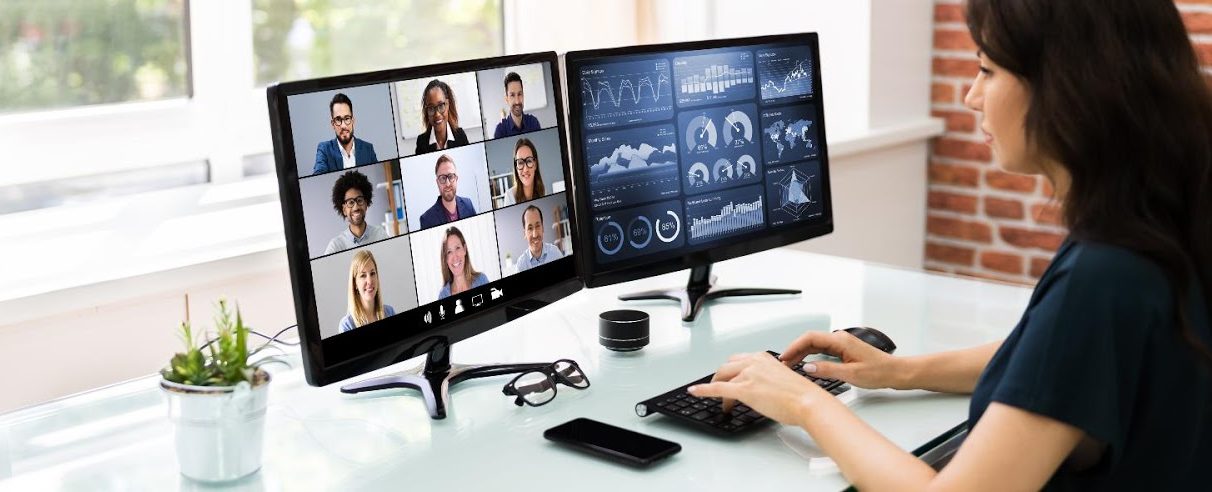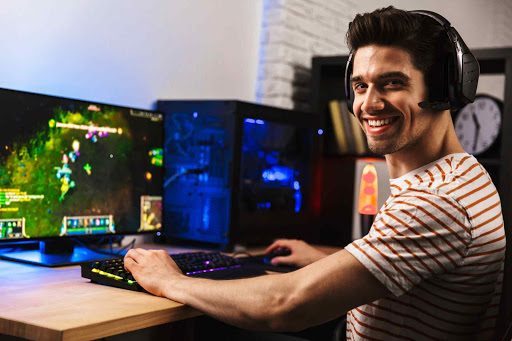The Hardest Part
What is the generally accepted hardware of the average home office? Well, it’s all the visible IT-related items you require to connect seamlessly to the internet – ranging from routers, switches and screens, to mouses, servers, cables and computers.
If you’re launching a new business from home, or seeking to kit out a small business premises now that lockdown is on the wane, you’ll probably want to start by choosing between Apple Mac or PC; and whether you wish to be deskbound with a high-tech monitor or to instead purchase a laptop so that you can work from just about anywhere.
Think, for example, that coffee shop on the corner with their perfect COVID safety protocol, flat whites to die for and the dishy-est of peeps in suits, skirts and stripes.
As an aside, and while not an item of hardware, remember that getting extra RAM will speed up your Mac or PC tremendously, allowing applications to load more rapidly and facilitating the instance of having multiple different tabs open at one time, without anything going at snail’s pace or causing the dreaded “beach ball of doom” to lurk, when an application stalls – or shuts down – without any warning.
Undoubtedly, your biggest business purchase is going to be that laptop or desktop computer. For the Mac aficionados, see the full range of options at Apple.com. You can store all your data in the Cloud (via iCloud, obviously), and a range of built-in apps are there to assist you in being as creative and productive as is humanly possible.
Wallet Watcher
If you’re open to either brand and simply desire the most budget-friendly option that gives you all the bells and whistles for the job at hand, it’s wise to peruse the reviews at PCMag.com.
Top-rated options range from the Acer Aspire TC-885-UA92 Desktop, a top pick for value and performance, to the $699 Apple Mac Mini (2018), which is best for “space-strapped content creators” and the HP Envy Desktop TE01-014, which is rumoured to be the “best fit for home-office productivity”.
Hardware analyst Matthew Buzzi advises that the budget desktop is no longer the equivalent of a device that is low-quality or slug-slow; in fact, this online publication showcases “a modest baseline for performance and decent flexibility, while lasting longer than they used to” in the range from below $500 to $800 tops, proving to be a distinct advantage for the budget conscious. Matthew adds that Intel is more than worth a passing glance, with its 4-star Intel NUC Kit – this setup is ultra neat and budget-friendly. Others worth noting are the offerings from Azulle (the Azulle Inspire Mini PC) and ECS (the ECS Liva Z3 Plus). Check out prices and features to assess their suitability for you and your unique business offering.
Space Cadet
What ranks highly for most entrepreneurs is the fact that many of the systems mentioned above measure just a few inches in each direction, so they serve to save you space (if you’re starting out in the corner of a shared office or home dining room) as well as being cost-effective. Set them up “behind a monitor or HDTV”, the experts suggest, and they’ll be out of sight, neat and effective. The bonus, according to Matthew (let’s call him Matt), is that these systems are not just mini, but they offer an enviable number of ports making them highly versatile on the usage front.
Game Player
The experts, of course, acknowledge that you may prefer a “more traditional tower” or a “favorite cheap laptop”. Indeed, options abound if you do your research just right, consult the experts, and also give your sisters and brothers in the industry a call to see what has worked for them – comparing notes and sharing success stories (and the odd miserable failure that spurred you on to greater heights) never hurt anyone. But how about if you need your system to give you a little leisure time – after hours?
This is really where PCGamer’s performance per dollar allegory comes into play. This is because an issue many gamers encounter is that there’s really no decent stock on the best-of-the-best PC components – from GPUs, to CPUs and even power supplies. Really needing to chill post-work with an online gaming crowd? Just go to PC Gamer’s “Best Gaming PC”, where you can read about how to set up the perfect gaming PC this side of 2025.
According to senior hardware editor Alan Dexter, “As long as you pick a rig from one of the best gaming PC builders, then their after-sales service ought to make it the most stress-free [experience] too.” He adds: “Sure, building a gaming PC for yourself can be immensely satisfying … but simply buying one as a complete system will take any and all the hassle out of the process. Even if you’re heavily into upgrading your own machines, there does come a point where the best thing you can do for yourself is pick up the best gaming PC as a new foundation for future upgrading endeavors.”
You know, it’s not – in the end – about price or prowess, but really about what works for you in your own unique business and leisure setup. What you acquire needs to fit seamlessly with what you’ve already got; and what you’ve already got – for it to keep working – needs to be upgradeable, uploadable and just plain neat. Nuff said.




 Bitcoin
Bitcoin  Ethereum
Ethereum  Tether
Tether  XRP
XRP  Solana
Solana  USDC
USDC  TRON
TRON  Cardano
Cardano  Lido Staked Ether
Lido Staked Ether  Avalanche
Avalanche  Toncoin
Toncoin